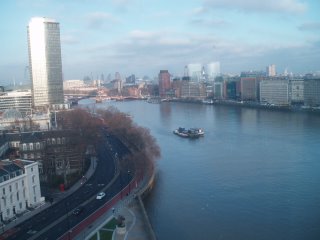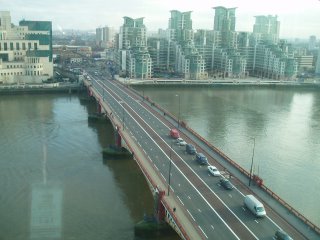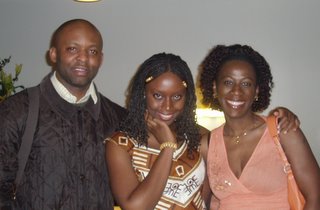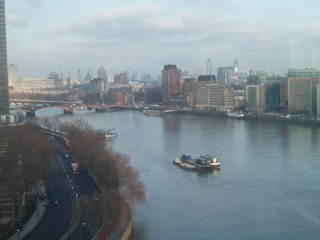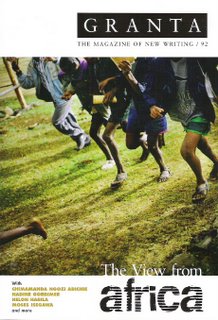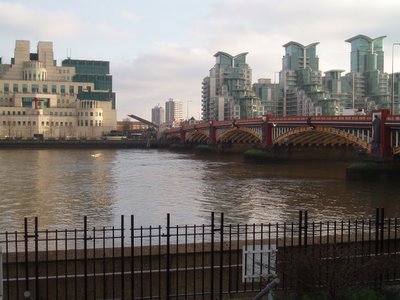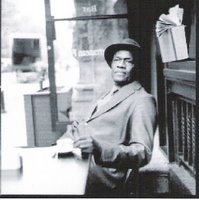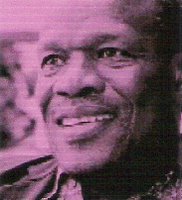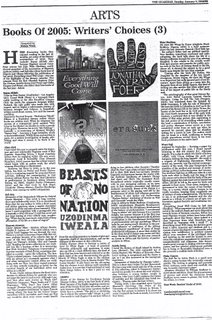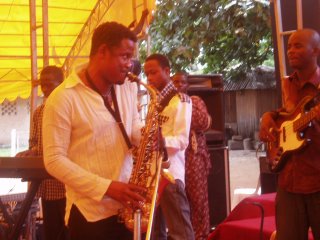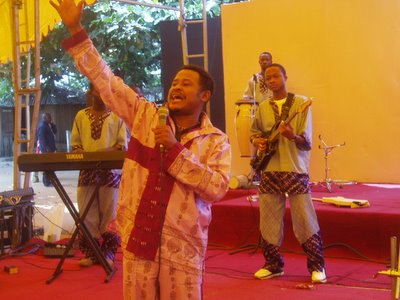Compiled by Molara WoodIn the second of our look at the ‘reading year’, author of
Purple Hibiscus,
Chimamanda Ngozi Adichie and
Professor Femi Osofisan discuss some of the books that impressed them in 2005. They are joined by other writers, including:
Uche Nduka (author of
Heart’s Field),
Nnedi Okorafor-Mbachu (
Zahrah The Windseeker) and
Tade Ipadeola (
The Rain Fardel).
Chimamanda Ngozi Adichie
I enjoyed
The Professor’s Daughter, Emily Raboteau’s first novel. I much admired the prose, the fierce intelligence, the way she looks race straight in the eye and yet creates characters that are all fully human; not at all illustrative puppets.
There is a human, humane and almost earnest quality about Ian McEwan’s
Saturday that I, irony-weary, loved. McEwan so masterfully handles the elements I most enjoy about fiction: character, pacing, language, emotion, plot, attention to detail; I cared for his characters.
Ike AnyaStuart- A Life Backwards by
Alexander Masters - A sensitive and thought provoking true account of the life of Stuart Shorter, a homeless man on the streets of Cambridge, beginning with his suicide and working its way back to his terrible childhood. It is humorous, moving and challenging with insights as to how a cherubic looking young boy ended up on the streets.
Tropical Fish: Tales Out of Entebbe by
Doreen Baingana (University of Massachusetts Press) - Although ostensibly a collection of short stories, Baingana gripped me from the first page to the last with her humorous, beautifully recounted tales of Ugandan sisters growing up, through boarding school and university in Entebbe and Kampala, living under the spectre of AIDS, emigrating to the US and returning home in a soon to be disillusioned hope.
Arrows of Rain by
Okey Ndibe (Heinemann) - A searing reminder of what it was like living in the duplicitous madness of the Abacha years, and redolent with the scent, taste and sounds of Lagos and the Bar Beach, although set in the fictional state of Madia.
Patrick Neate’s
City of Tiny Lights, tackling questions of race, culture and identity in 21st century London was prophetic, being published only a few weeks before the London bombings and perhaps that heightened its impact on me. He showed a clear understanding of the issues and captured the joyous, diverse energy and contradictions that make London in 2005 such an interesting place to be.
Victor Ehikhamenor
I enjoyed reading
Fences, a play by
August Wilson - and
The Pickup, a novel by
Nadine Gordimer. In
Fences, Wilson captured the struggle of blacks in America in the late 50s to 60s. The work’s timelessness and the humorous way in which the playwright captured the pain, oppression, pressure and disillusionment - makes it a classic. The symbolism of Fences cannot be undermined… Daily, we either fence people out, or people fence us out of a system that works.
Gordimer’s novel of migration, immigration and emigration hits close to home for me. Many immigrants have similar experience to that of Ibrahim, the protagonist in
The Pickup. Many immigrants "pickup" white women to get papers or get "picked up" by white women as a collector’s item. Symbolically, both books have the same ring tone…make the fence higher, so the black man cannot scale it.
Tade Ipadeola
It is a thing of hope to note that in a year in which I read, amongst others,
John Steinbeck’s
Cup of Gold,
Mario Vargas Llosa’s
Notebooks of Don Rigoberto and
Michael Moore’s
Stupid White Men, my two best books are African!
I had read an excerpt of
Sefi Atta’s Everything Good Will Come (Farafina), published in Glendora years earlier. But, read in its entirety - in the writer’s context - the novel surprised me; for it’s fierce intelligence, the sheer humour. To me, it illustrates what the scholar Harry Garuba has consistently referred to as animist realism in African fiction. Set in the age of rogue soldiers, the book affirmed, to me, the enduring value, in any society, of the warrior. Mind you I say ‘the warrior’, not ‘the soldier’. Gender, to which many of the book’s reviewers have turned for a generic tag, is really secondary. Enitan is a warrior and her gender does not even begin to matter. I hope the book inspires life to imitate art. It is really a stupendous work. I do not think a first novel has affected me the way
Everything Good Will Come has, except perhaps
Arundhati Roy’s
The God of Small Things. I really believe that we have in Atta a new exemplar in the art of narratives. My one real fear is that she may have done her best work in that one book, it was that good in my estimation. She did it well.
I believe it was the
Robert Browning that said: "He that keeps one end in view / makes all things serve." That observation has never been truer for me than in my reading of
Kenule Saro-Wiwa’s Compte Rendu of the Nigerian Civil war,
On A Darkling Plain. It is a very different book, from a completely different tradition, than
Everything Good Will Come. But you can still see certain themes reverberating across: the war; leadership or the lack of it; love under strained skies; the inheritance of contemporary Africans. Saro-Wiwa’s book treats the problem of distributive justice in Nigeria like no one else can. I have wondered why God lays the burden of such acute vision on members of ‘minority’ groups. Saro-Wiwa was Ogoni. I couldnt help but draw parallels between his way of telling his story and, say,
Antjie Krog’s way of doing her thing (in
Country Of My Skull). Would Krog still be able to do it thus were she not Afrikaneer? Who else but an Ogoni could write
On A Darkling Plain?
Uche Nduka
The films of Mike Leigh by
Ray Carney and
Leonard Quart (Oxford University Press) - is a book squarely focused on the humane, empathetic, unpretentious, and stylistically diverse film work of the British Independent filmmaker. Leigh’s films - beginning with
Bleak Moments (1971) right down to
Naked (1993) - are deeply topical, emotionally articulate, socially astute, cinematically fluxional. He finds personal, political, philosophical hypocrisies grating and pummels them mercilessly in his work. I like this book because it is the first in-depth critical study of this sometimes feisty, sometimes lyrical director who knows how to instructionally lament and laugh at the complex textures of life.
In
My Invented Country: A Memoir by
Isabel Allende (Harper Collins), the US-based novelist scans the underbelly and the outer reaches of her native Chile. Her touching exploration of her country is a very knowledgeable, loving and critical exercise. Her memoir makes me want to take the next flight to Chile. A country blessed with brilliant, passionate citizens that seem to verge on the anarchic, Chile reminds me a lot of Nigeria, my own cataclysmic country. With humour, she details the socially hilarious mores of her countrymen and women - their love lives, religious beliefs, political situation, ideals, pride, and disorder.
Allende’s memoir is creatively and robustly penned. Realism and magic mingle on the pages just like in her novels. I like the book particularly because of the way her invocations of her extended family embrace the affectionate and the exasperating. She is not out to whitewash her origins. Additionally, her unapologetic feminism is highly commendable. Read this book and frolic in it. It is a great read.
Wole Oguntokun
This House Has Fallen - Nigeria in Crisis by
Karl Maier (Penguin Books) caught my attention because it seemed to be a continuation of
Kole Omotosho’s excellent docu-fiction (my term) on Nigeria,
Just before Dawn. I haven’t seen a title that better describes the Nigerian situation than Maier’s, and the contents for the most part, truly (and painfully) document the way our country’s affairs appear to the unbiased eye.
Olodumare - God in Yoruba Belief by
E. Bolaji Idowu (Longman, First published, 1962) has details on deities, religions and moral values that have broadened my mind. I’ve always wanted insight into ancient Yoruba culture and customs, and this is one of the richest I have had the privilege of owning.
Nnedi Okorafor-MbachuPublished posthumously,
Lemona’s Tale is
Ken Saro-Wiwa’s last novel. Narrated by a woman on Death Row for a crime she didn’t commit, the novel is very short and equally sweet, and hit me like a punch in the stomach. It’s one of the few Nigerian novels written by a man that feels genuinely sympathetic and understanding of the plight of Nigerian women.
My sister and I read
I Saw The Sky Catch Fire by
T. Obinkaram Echewa while we were in Nigeria last March. It is one of the greatest pieces of story weaving I’ve read in a long time. It addresses a historical event that I’ve wanted to see novelized for a long time - the Igbo Women’s War of 1929. The novel also has excellent insight into the fight and fire inherent in the Nigerian woman’s heart. An excellent novel.
Everything Good Will Come by
Sefi Atta is the story of two girls who grow into women in Lagos in the 70s, 80s and 90s. One character is sheltered and the other needs some sheltering. Lyrically written, this novel is honest, unafraid and unapologetic, which is what I love in a good novel. It shows the durability and resilience of Nigerian women today. A really strong first novel.
Only African American science fiction legend,
Octavia Butler could have completely reinvigorated the overdone ‘vampire novel’.
Fledgling (Seven Stories Press) is narrated by and about Shori, a 53 year old vampire who looks like a ten years old black girl. She’s lost her memory and someone is trying to kill her. The vampires in this novel are not your usual bloodsucking senseless monsters but they will scare you (just not how you think). As with all of Butler’s novels, Fledgling will leave you considering things you once assumed. ..
Femi Osofisan
I've been thinking, and finally, I've decided that my best books for the year will have to be:
Toyin Falola’s
A Mouth Sweeter Than Salt (University of Michigan Press), and
Sefi Atta’s
Everything Good Will Come.
Falola’s book knocks me out for two reasons: first, its language, where he’s added new ‘salt’ to the use of Yoruba proverbs; and secondly, the story it tells, of the turbulent political life of Ibadan, in the years precisely when I have taken residence in the city. It is Falola’s autobiography, the early part of his life, but since we are contemporaries, you will understand why therefore, in a sense, it reads also like my own story, about a life I know so intimately, and a city and characters who are part of the drama of my own life. I am looking forward eagerly to the sequel, since the story is not ended yet!
As for
Sefi Atta, she is obviously an extremely talented story teller, and knows how to keep you fascinated from page to page. It is also the Lagos that I know, and the events and stories are familiar. I am impressed that, even though the book is primarily about the female condition in our society, and she comes down hard on the men, she also manages to weave in quite a lot of the political stuff. Cleverly, without sounding overtly didactic, she exposes the nation’s ills: the inefficient infrastructure, the incompetent elite, the corrupt political leadership, and the shoddy, insecure life we all lead behind our barricaded houses. I feel that this fierce denunciation of our traditions and patriarchal cruelties is one-sided. Like in Chimamanda Ngozi Adichie’s book, fathers come out very badly, and all the men are obviously devils. I am frankly taken aback, I’d not realized that this is what we have created our women to be. Still, I salute her eloquence and incredible power of narration. I only hope that, in the next book, she will be more happy - and perhaps more forgiving.
Readers’ Books of the YearWhich book did you enjoy reading most during the year and why? Was it a work of fiction, non-fiction or poetry? Send us your choice of ONE book, not forgetting the author’s name - and tell us in no more than 100 words why you recommend it to other readers. A selection of reader’s chosen books will be featured on this page. Please send your contribution to Molara Wood at: laralara8@hotmail.com - by Friday 6th January.*Published in The Guardian - Sunday 1 January, 2006
